May 5th, 2015 by Dr. Val Jones in Expert Interviews, Research
1 Comment »
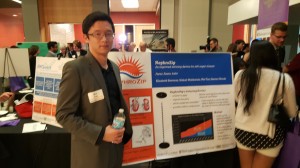
People's Choice Winning Idea: NephroZip
It’s no secret that doctors are disappointed with the way that the U.S. healthcare system is evolving. Most feel helpless about improving their work conditions or solving technical problems in patient care. Fortunately, one young medical student was undeterred by the mountain of disappointment carried by his senior clinician mentors and had the courage to tackle the problem head-on. Three years ago, Avik Som organized “Problem Day” at his medical school (Washington University School of Medicine in St. Louis, MO) and invited his professors to an unrestricted “open mic” venting session.
Representatives from the departments of surgery, medicine, pediatrics and neurology attended. They described their frustrations and day-to-day struggles with the students for 3 hours straight. After decades of service to suffering patients, it was the first time that anyone had asked them to share their own stories.
And borne out of this collective catharsis was IDEA Labs (a 501c3 ) – a student-driven movement to tackle clinician problems with fresh ideas and the energy of youth. I attended the third annual “DemoDay” (also known as “Solution Day”) presentations in St. Louis this week and was amazed by the breadth and depth of the student solutions to specific clinical problems. From plastic ties to hasten renal surgical procedures to energy efficiency units for hospital HVAC systems – the ideas spanned many technical knowledge domains, and investors in the audience paid rapt attention.
This year’s first-place winning idea was the Cystoview adaptor. Bladder scopes (or cystoscopes) represent a surprising 0.5% of Medicare’s total annual expenditures. Yet they still rely on old analogue technology and their images are difficult to share and transfer. The Cystoview device converts any cystocscope from analogue to digital, and images can be uploaded anywhere – from a desktop computer to a smart phone. Once collected, digital images can be mapped and reconstructed into a 3-D bladder scan so that surgeons can plan to more effective tumor resections. In addition, having the cystoscopes go wireless reduces the risk of infection associated with cords dragging across surgical fields.
IDEA Labs is unusual for several reasons. First, it was designed as a joint venture between professional schools at Washington University – Avik Som wanted to draw talent from Engineering, Business, Law, and Sciences to create multi-disciplinary student teams. The cross-pollination of student ideas can lead to some especially creative solutions.
Second, students retain 100% of the intellectual property associated with their solutions. So whether they design a specialized lumbar puncture chair, digital cystoscopy device, wheelchair storage mechanism, or new blood test for cancer, they are responsible for pitching their idea to angel investors and creating a business plan that will bring their ideas to market.
Third, IDEA Labs is student-driven, and therefore agile and independent from the administrative and political hurdles that can slow down innovation at academic medical centers.
Last year IDEA Labs students raised $300K in venture capital funding for their ideas. This year, they raised $1.5M. They are also actively franchising their student innovation model to other schools across the country.
Ramin Lalezari is a second year medical student and Director of Recruitment for IDEA Labs’ Executive Board. He is also an American Resident Project fellow (an organization that seeks out promising young medical students and residents and supports their writing talent – they also sponsored DemoDay this year). I got the chance to catch up with him at DemoDay. He described how he got involved with the project as a first year student, and worked with a team of engineers to design a system that detected pre-syncope in hospitalized patients, reducing the risk of possible falls.
“When I heard that medicine lags 50 years behind technology, I was horrified. Why do we still have pagers and fax machines?” huffed Lalezari. “We must do better. Students themselves will drive technology and innovation. We are going to build a network of incubators across the U.S., using telemedicine when appropriate. If a student in Los Angeles is passionate about solving a urology problem with engineers in St. Louis, then we will facilitate it. The student project manager pitches his idea, and students nationwide can sign up to help. Some of these design ideas are going to change the face of medicine. That’s our end game.”
I asked Lalezari if IDEA Labs would draw students away from practicing clinical medicine.
“There is no doubt that these projects require a time commitment. A few teams have disbanded due to the overwhelming burden of studying for exams. So some are quitting IDEA Labs. On the other hand, I’ve heard of some students who become so invested in their ideas that they talk about making a career out of it.”
“Are other medical schools developing their own IDEA Labs model for entrepreneurship?” I asked.
“There are 24-hr ‘hackathon’ models out there, and senior design projects that are formalized courses. IDEA Labs projects are 9 months long, with mentor-guided progress reports every 2 months. Most schools foster entrepreneurship from the top down – administrators and professors drive the ideas and the schools retain the intellectual property. I think that the bottom up approach resonates much more strongly with students.”
IDEA Labs may have turned the long-entrenched apprenticeship model of healthcare innovation on its head. No longer are students vying for the honor of supporting the design ideas of senior physicians in unpaid or underpaid internships. They are identifying problems and solving them in teams of peers without the hierarchy imposed by academic-driven projects. They have leveled the playing field and stand to gain a lot more from their hard work than ever before.
Although medicine may still be a dinosaur when it comes to technology adoption and innovation, the IDEA Labs students are replacing the soloist T. Rexes with team-working Raptors. And that represents a true leap forward in the evolution of healthcare.
***Demo Day was sponsored by The American Resident Project and J&J Innovation. For more information about how to get your school involved with IDEA Labs, please contact wustl.ideas@gmail.com.
December 19th, 2011 by Bryan Vartabedian, M.D. in Opinion
No Comments »

 Let’s say you’re a doctor and you have an idea, opinion, or a new way of doing things. What do you do with it?
Let’s say you’re a doctor and you have an idea, opinion, or a new way of doing things. What do you do with it?
It used to be that the only place we could share ideas was in a medical journal or from the podium of a national meeting. Both require that your idea pass through someone’s filter. As physicians we’ve been raised to seek approval before approaching the microphone.
This is unfortunate. When I think about the doctors around me, I think about the remarkable mindshare that exists. Each is unique in the way they think. Each sees disease and the human condition differently. But for many their brilliance and wisdom is stored away deep inside. They are human silos of unique experience and perspective. They are of a generation when someone else decided if their ideas were worthy of discussion. They are of a generation when it was understood that few ideas are worthy of discussion. They are the medical generation of information isolation.
I spoke with a couple of students recently about Read more »
*This blog post was originally published at 33 Charts*
July 11th, 2011 by IsisTheScientist in Opinion, Research
No Comments »

Yesterday I went to go see my friend, the recently infrequently-mentioned Dr. Buttercup. When I first came to MRU, Dr. Buttercup was gracious enough to allow me to share lab space with him. That, coupled with our mutual love of beer and cake, meant that we saw each other quite frequently. Now that I have moved into other laboratory digs and find myself full of people, I see less of Dr. Buttercup and am the recipient of far less of his wisdom. It’s a shame. I miss that dude.
Then again, as soon as that guy received a grant score that someone told him was “fundable”, he became insufferable. Show off.
But, I digress. I saw Dr. Buttercup yesterday about a different matter and we got to discussing the idea of collaboration. He shared the notion that, as an Assistant Professor, collaboration is one of the funnest things he does. It’s also potentially one of the most dangerous because it robs your time without real reward. Still, brainstorming new experiments is fun and sometimes that additional effort on someone else’s grant pays the bills.
This made me think that the same is true for postdoc-level scientists and made me think about some collaborations I got myself into once upon a time. You see, when you’re a newly-minted, grown-up scientist, you’re on top of the world. Perhaps you start to feel like an expert in something and, perhaps, you’re enthusiastic to show the folks around you how good you are at what you do.
Don’t do it. Read more »
*This blog post was originally published at On Becoming a Domestic and Laboratory Goddess*
May 5th, 2011 by Dr. Val Jones in Announcements
No Comments »
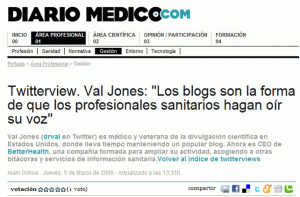
I am so pleased to announce a new content partnership between Better Health and Diario Médico (DM), Spain’s leading news outlet for physicians. We will now be featuring regular content from the DM bloggers, translated for our readers from Spanish to English. The medical blogging community is a global family, and we proudly embrace our Spanish innovators overseas.
I first met the DM team two years ago on Twitter. Their lead social media guru, Alain Ochoa-Torres (@alainochoa), was the first to reach out to me – eager to learn about social media trends in the United States. We arranged to do a live “Twitterview” to talk about how U.S. physicians are engaging in social media, especially blogging. That Twitterview (screen shot shown to the left) was translated into Spanish and became the beginning of an exciting international collaboration.
In the future, Better Health hopes to find ways to make Spanish health content available to our readers… and with DM’s help I’m sure that we will expand our understanding of global health, while making friends with our new Spanish blogging colleagues!
Please join me in welcoming our new blog contributors:
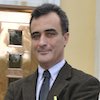 Sergio Minué, MD.
Sergio Minué, MD.
General Practitioner (GP). Management professor at Andalusian School of Public Health (Escuela Andaluza de Salud Pública, EASP) since July, 2000.
In the last eleven years Dr. Minué has been involved in several projects related to education, investigation and consulting both at national and international level. He has worked in projects for Dominican Republic, Uruguay, Chile, Argentina, Morocco and El Salvador, and collaborated with Pan American Health Organization (PAHO) in other actions.
At the present he is Director of the Expertise in Healthcare Management program at University of Granada and coordinates healthcare management module in European Master ‘Erasmus Mundus’ Europubhealth.
Served as Director of Medical Care Management Department at EASP from February 2009 to May 2010.
Worked as Teaching and Investigation Director at EASP from 2003 to 2007.
From 1993 to 2000 held different management positions at Insalud (now-defunct Spanish national healthcare authority): Medical Director of Primary Care Team at Barajas (1991-1993), Assistant Medical Director of Primary Care of Madrid’s Area 4 (1993-1994), Medical Director of the same regional area (1994-1996) and finally Medical Director of Primary Care for Madrid’s Area 2 (1996-2000).
Quality Pilot in European Master ‘Erasmus Mundus’ Europubhealth (2006-2010). During that time he coordinated Quality Committee of Virtual Campus of Public Health in Latin America organized by PAHO.
Member of Patient Safety groups at Cochrane and Spanish Primary Care Association (Semfyc). At Semfyc he is also member of the Knowledge Management group and coordinates Project ARA, focused on MD re-certification.
Member of Internet and Healthcare investigation group at EASP, he is currently working in several investigation projects on how doctors can use new technologies, social media and Web 2.0. He is also involved in projects related to best practices in teaching, safety, clinical decision-making and Primary Care. He is the leading author of an ongoing investigation on decision-making and mistakes in diagnosis. Reviewer for ‘Gaceta Sanitaria’ magazine. Participates in expert groups in Spain, Europe and the Americas.
He authored articles published in scientific journals both in Spain and abroad, and is a frequent lecturer and speaker in scientific congresses all over the world and is still actively writing and publishing in his field of expertise. He writes in two personal blogs (‘El Gerente de Mediado’ and ‘La Cara Ve’) and is a regular contributor to other healthcare blogs and Diario Médico.
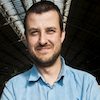 Miguel Ángel Máñez, Economist.
Miguel Ángel Máñez, Economist.
Miguel Ángel Máñez is an economist and currently holds the position of Finance and Human Resources Assistant Manager of the Health Department of Alicante-Sant Joan d’Alacant in Alicante, Spain. He is also the Coordinator of the ‘2.0 Office’ for Valencia’s regional health authority, responsible for the implementation of Web 2.0 tools aimed at patients and healthcare professionals. He is the author of a well-known blog in Spain about healthcare management called ‘Salud con Cosas’. He has taken an active part in courses and seminars about Internet and healthcare, marketing, and strategies of healthcare management. He is the author of several articles on healthcare and Web 2.0.
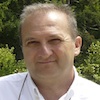 Vicente Baos, MD.
Vicente Baos, MD.
General Practitioner (GP) in Collado Villalba Pueblo (near Madrid), writes ‘El supositorio’ (‘The Suppository’) since 2007, one of Spain’s most influential healthcare blogs.
Graduated in 1982 at Universidad Autónoma de Madrid, completed his training at Puerta de Hierro Hospital (Madrid) in 1987. Member of Editorial Board at ‘Therapeutiction in Spanish Healthcare System’ (‘Información Terapéutica del Sistema Nacional de Salud’), a journal published by Spain’s Ministry of Health since 1994.
Dr. Baos also coordinates Prescription Drug Use group at Spanish Primary Care Association (Semfyc) since its creation in 2003. He is a consultant at Spain’s Drug Agency (‘Agencia Española de Medicamentos y Productos Sanitarios’). Author of several books on prescription drug use (some of them for MD’s and others targeted at general public) and a long list of scientific articles.
His main areas of interest are Primary Care and the analysis and evaluation of pharmacological therapies.
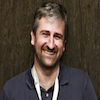 Frederic Llordachs, MD.
Frederic Llordachs, MD.
MD with MBA, specialized in Healthcare Management and Marketing. Direct experience with healthcare insurance, and healthcare management, and interested in venture capital. Also involved in early-stage start-ups, like Doctoralia (http://www.doctoralia.com), the global platform for healthcare search, and also other pre-seed projects like Lexpertia (http://www.lexpertia.com), the search engine for lawyers in Spain.
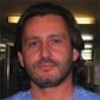 Julio Mayol, MD, PhD.
Julio Mayol, MD, PhD.
Julio M. Mayol MD, PhD, graduated with honor from Universidad Complutense de Madrid Medical School in 1988. He received his training in General Surgery at Hospital Clinico San Carlos and Beth Israel Hospital, taking further postgraduate training as research fellow in Surgery at Harvard Medical School. Currently, he he has an appointment as Professor of Surgery at Universidad Complutense de Madrid Medical School. He serves as Chief Innovation Officer and Chief of the Division of Colorectal Surgery at Hospital Clinico San Carlos. He is a member of the Spanish Royal Academy of Medicine and European Expert on Cell Therapy at European Medicines Agency.
About Diario Medico:
Since 1992, Diario Médico has been Spain’s leading news outlet for physicians. Part of one of Spain’s most important publishing groups (Unidad Editorial, publisher of El Mundo ), Diario Médico is both a website and a free newspaper distributed Monday to Friday in all hospitals and general practitioner offices across Spain.
The publication covers a wide range of subjects, from breaking scientific news to health policy, in-depth interviews, scientific meetings, clinical practice, legal issues, management, and health IT.
Diario Médico reaches 2.4 million paper readers and 450 thousand website visitors (more than 500 thousand pageviews/month).
The brand strives to be a cutting-edge reference tool for all healthcare professionals in Spain, and its website is constantly innovating. Diario Médico provides online courses as well as speciality-specific newsletters, video reports and Web 2.0 content such as Twitterrviews and a medical blogging platform (Médica Blogs).





















